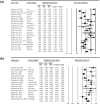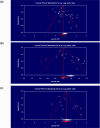Opium use and gastrointestinal cancers: a systematic review and meta-analysis study
- PMID: 38994503
- PMCID: PMC11234493
Opium use and gastrointestinal cancers: a systematic review and meta-analysis study
Abstract
Aim: The current systematic review and meta-analysis aimed to assess the association between Gastrointestinal (GI) cancers and opium use.
Background: GI malignancies are a global public health issue and are associated with many risk factors including genetic and lifestyle factors.
Methods: PubMed, Web of Science, Embase and Scopus and the Google Scholar search engine in addition to Persian databases including Magiran and SID were searched using relevant keywords. The associations of opium use, long duration of opium use, high daily amount opium use and high cumulative opium use and GI cancer and various subtypes of GI cancers were estimated and pooled in format of odds ratios (OR) and their corresponding 95% confidence intervals (CI) with a random effects model.
Results: 22 articles that were published between 1983 and 2022 entered the analyses. There were significant relationships between opium use based on crude effect sizes (OR: 2.53, 1.95-3.29) and adjusted effect sizes (OR: 2.64, 1.99-3.51), high daily opium use (or: 3.41, 1.92-6.06), long duration of opium use (OR: 3.03, 1.90-4.84) and high cumulative opium use (OR: 3.88, 2.35-6.41), all compared to never opium use, and GI cancer. The results were not sensitive to sensitivity analyses and no influential publication biases were found in these analyses.
Conclusion: Our meta-analysis showed that opium use could be associated with increased risk of overall and some particular GI cancers including oropharyngeal, gastric, pancreatic and colorectal cancers. Opium use as a potentially modifiable factor, therefore, should be more emphasized.
Keywords: Cancer; Gastrointestinal tract; Meta-analysis; Opium.
© 2024, Gastroenterology and Hepatology From Bed to Bench (GHFBB).
Conflict of interest statement
The authors declare no competing financial interests.
Figures




Similar articles
-
The significant impact of opium use on various types of cancer: an updated - systematic review and meta-analysis.BMC Cancer. 2025 Feb 25;25(1):353. doi: 10.1186/s12885-025-13768-y. BMC Cancer. 2025. PMID: 40000967 Free PMC article.
-
Opium as a carcinogen: A systematic review and meta-analysis.EClinicalMedicine. 2021 Feb 24;33:100768. doi: 10.1016/j.eclinm.2021.100768. eCollection 2021 Mar. EClinicalMedicine. 2021. PMID: 33718852 Free PMC article.
-
Human papillomavirus and gastrointestinal cancer in Iranian population: A systematic review and meta-analysis.Caspian J Intern Med. 2017 Spring;8(2):67-85. doi: 10.22088/cjim.8.2.67. Caspian J Intern Med. 2017. PMID: 28740634 Free PMC article. Review.
-
Association between chili pepper consumption and risk of gastrointestinal-tract cancers: A meta-analysis.Front Nutr. 2022 Nov 3;9:935865. doi: 10.3389/fnut.2022.935865. eCollection 2022. Front Nutr. 2022. PMID: 36407551 Free PMC article.
-
The Effect of Opioid Use on Esophageal Cancer: A Systematic Review and Meta-analysis.Addict Health. 2025 Jan;17:1533. doi: 10.34172/ahj.1533. Epub 2025 Mar 10. Addict Health. 2025. PMID: 40458270 Free PMC article. Review.
Cited by
-
The significant impact of opium use on various types of cancer: an updated - systematic review and meta-analysis.BMC Cancer. 2025 Feb 25;25(1):353. doi: 10.1186/s12885-025-13768-y. BMC Cancer. 2025. PMID: 40000967 Free PMC article.
References
-
- Sung H, Ferlay J, Siegel RL, Laversanne M, Soerjomataram I, Jemal A, Bray F. Global Cancer Statistics 2020: GLOBOCAN Estimates of Incidence and Mortality Worldwide for 36 Cancers in 185 Countries. CA Cancer J Clin. 2021;71:209–249. - PubMed
-
- Onyoh EF, Hsu WF, Chang LC, Lee YC, Wu MS, Chiu HM. The rise of colorectal cancer in Asia: epidemiology, screening, and management. Curr Gastroenterol Rep. 2019;21:1–10. - PubMed
-
- Arnold M, Sierra MS, Laversanne M, Soerjomataram I, Jemal A, Bray F. Global patterns and trends in colorectal cancer incidence and mortality. Gut. 2017;66:683–691. - PubMed
Publication types
LinkOut - more resources
Full Text Sources
